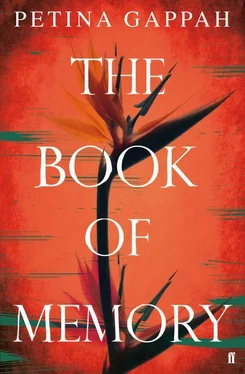I have a Good News Bible here. It is the only book that Synodia will allow us to read. It is a simple one, this version, with none of the grace and majesty of the King James that Sister Mary Gabriel taught me to love.
I only mention this Psalm because I wondered often, when I was a child, how I would die, from which you can rightly conclude that I was a particularly morbid child. I was simultaneously fascinated and terrified by the idea of the guillotine, with that glinting steel that was sharp enough to slice off a royal head while the knitting needles clacked.
Safe in the knowledge that I was not a French royal, I imagined other deaths. Being poisoned by a tarantula, for example, and dying in a paroxysm of ecstasy; do you remember an Inn, Miranda, do you remember an Inn, and the tedding and the spreading of the straw for a bedding.
When I began to ride Copperplate across Umwinsidale with Liz Warrender, I was terrified that I would fall and break my neck. But the exhilaration of guiding my horse over the downs and of riding across the Nyanga hills soon came to conquer my fear of falling.
It was drowning that terrified me the most, because with water I associated the njuzu that people said lived in the Marimba River. I am not quite sure how to explain njuzu to you; there is no direct equivalent in your mythology. It is convenient to translate it as a mermaid or a water sprite, but it is more sinister than either. Mermaids sit sedately on rocks; they flick their tails and comb their hair. They sing and seduce. Water sprites cavort in, well, spritely fashion. Njuzu are violent, they are wild beyond taming. They rise up in the air and become one with the clouds. They become hurricanes and storms. They transform into snakes and crocodiles. Njuzu capture the unwary and pull them down, down beneath the waters. They are especially fond of children.
Under the water, they train you in the art of magic. And if any member of your family weeps for you, njuzu will kill you at once. But if no one weeps, if your family allows you to go unmourned, you emerge after years and years with gifts of healing and prophecy.
I had no distinct image of njuzu in my mind. It was all fear and speculation. It was only when I was sold and sent to Umwinsidale that I gave it form. Njuzu became, to my imagining, the frightful creature that I saw in one of Lloyd’s books, Bellerephon’s Chimera, the fearful beast of immortal make, snorting terrible flames of bright fire.
In my dreams, it pulled me to itself; it dragged me down into the water. Umwinsidale gave my fear its form, but it also cast it out. The fear of drowning stayed with me. Not even Lloyd’s doomed attempts to teach me to swim in the chlorine-blue safety of the pool at Summer Madness helped me.
There is an old English superstition that holds that if you escape death by drowning, you will be hanged. You could say I escaped drowning twice. I try not to but it is hard not to imagine the coarse, woven noose around my neck, my feet scrabbling in the air. I imagine people talking of me as the albino woman who was hanged. I find that idea repugnant, almost as abhorrent as the thought of my feet dropping into that empty space.
‘They will not hang a woman,’ Vernah Sithole said to me.
‘They hanged Nehanda,’ I said. ‘And Dorothy Strydom. Loveness told me about her.’
‘Nehanda was in 1898,’ was her rejoinder. ‘And the Strydom woman was pardoned. The same could happen to you; anything can happen after the election.’
But there may be yet another reason to hope. Last week’s Financial Gazette carried the headline ‘Country Lacks Hangman’. It would appear that, in addition to all the other shortages — no doctors, no nurses, no teachers, no books, no democracy, no sense — we are enduring a chronic shortage of people willing to tie nooses, slip them around the necks of their fellow men, string them up and drop them to their deaths.
‘The country’s severe economic crisis is having an effect on the delivery of justice,’ a Ministry of Justice official was quoted as saying. I laughed hard, great whooping laughs that made me choke. My eyes watered and the Financial Gazette became a film of pink in front of me.
There are currently fifty men and one woman ‘eagerly anticipating’, as the journalist put it, ‘the hangman’s noose’.
The same journalist wrote another story in the same paper about a crowd of women at the airport who were also ‘eagerly anticipating’ the President’s return from Asia. The country anticipates the President’s return as eagerly as we anticipate our death. From such unintended statements often comes the truth.
‘The fifty men and one woman on death row,’ the story continued, ‘might wait for ever. The last hangman resigned his post ten years ago.’
There was a large paragraph about my case, with Lloyd’s name misspelled. As the only woman on death row, I could not escape attention, but it was still strange to read about myself.
A few metres away, on the men’s side of this complex, are men who have been waiting for more than ten years for the hangman, living each day without knowing whether the vacancy has been filled at last. Loveness told me that there are five men who have been waiting for fifteen years to die. They have woken up every day, those men, expecting each day to be their last.
And at the end of the day comes the horrible reprieve, and they have gone to bed again and woken thinking: maybe this is it. Have they seen the paper, has anyone told them that they are waiting day after day because there is no hangman? Have any of their guards told them why they wait?
It was Loveness who brought me the newspaper with the news about the hangman. In the last two months, she has been bringing me a variety of papers. It is just one of the many odd things that Loveness has been doing lately.
She let me keep these notebooks and pens that you brought me, even after Synodia protested. It was strange to me that Synodia did not put her foot down; all that she did was was flick the fake hair of her hairstyle of the month and look at me in that way that suggests that, if I am not invisible to her, I should be.
Loveness has become considerate — chatty, even. In fact, she will not stop talking when she is around me. It is bad enough to have to spend all one’s time here without a prison guard going on and on about her interminably dull existence, which seems to centre on her church and her daughter. If I did not know better, I would think she wanted something from me. Loveness is not nearly as odious as Synodia or as dismissive as Patience, but in the last month or so she is positively the soul of benevolence.
‘This is for you; something special today,’ she said as she gave me the paper.
It was all I could do not to snatch it from her. It was the first complete newspaper I had seen in the two years that I have been here. This is what I have missed most in here, the simple, unremarkable wonder of having the printed word within my line of vision, on stop signs, adverts, newspapers, billboards, packaging on products.
The paper you discard without reading it, the books, the books, the glorious books. The crackle of an old manuscript, the dead smell of a hundred-year-old letter. Until I came to Chikurubi, I had never gone more than three hours without reading. Whenever Loveness brings me the newspapers, I drink them in quick, thirsty gulps. When I first got here, I thought I would go mad. I hallucinated pages rising like mirages before me, the letters dancing away when I reached out to touch them. I felt restless and unrooted. My thoughts chased each other. I understood finally what a desert-island book was.
I kept my mind sane through a constant repetition of the things I remember. ‘The House will once again, Mrs Dombey, be not only in name but in fact Dombey and Son. Hence! home, you idle creatures get you home: is this a holiday? It little profits that an idle king, by this still hearth, among these barren crags, match’d with an aged wife, I mete and dole unequal laws unto a savage race. I have spread my dreams under your feet; tread softly because you tread on my dreams. I was took up, took up, took up, to that extent that I reg’larly grow’d up took up.
Читать дальше












